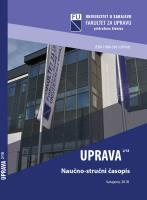BUDUĆNOST EUROINTEGRACIJA
FUTURE OF EU INTEGRATION
Author(s): Kenan Ademović, Edin RamićSubject(s): EU-Approach / EU-Accession / EU-Development
Published by: Fakultet za upravu, pridružena članica Univerziteta u Sarajevu
Keywords: deficiencies in the EU; the future of the EU; European integration; the EU institutions; European citizens;
Summary/Abstract: The rating in the official document entitled White Paper on the future of Europe - Considerations and scenarios for EU-27 to 2025, represents a strong support for the European project, but more is not unconditional. In fact, more than two thirds of Europeans see the EU as a stable place in a world full of economic hardship. More than 80% of countries supporting four key European freedoms, and 70% of citizens from the territory of the euro zone supported the single currency. However, it reduces the trust ofcitizens in the EU and in the governments of individual Member States. Today in the EU according Holding thirds of citizens, and ten years ago believed half of European citizens. What is an ongoing problem is overcoming the difference between promises and their fulfillment, partly because it is not easy to grasp the concept of the European Union in which they meet the European level and Member State level. Not sufficiently explained when is there for that charge, but the positive role of the EU in our daily lives can not see if the story is not told at the local level. Local communities are not always aware of the fact that the nearby farms, traffic networks or higher education institution, partly funded by the European Union. There is a mismatch between expectations and what the EU can do. A good example of youth unemployment: despite numerous meetings at the highest level and mostly useful measures of assistance by the European Union, the power and resources are still in the hands of national, regional and local authorities. So the funds available at European level in the field of social protection account for only 0, 3% of the amount which the Member States total spend. When considering issues concerning the future of the European Union and the sources of its legitimacy, there are two opposing views. On one side are those who gathered around the Coalition functionalists and federalists, on the other hand advocates of intergovernmental cooperation. In the first case should be answered all odds in a way to form a strong joint force and action to improve the situation. The EU institutions should be given greater powers and that its legitimacy gained from the more direct participation of European citizens in their choiceand work. However, for this scenario would be necessary to re-start the process leading to the adoption of a constitutional nature of the document at the European level. In this connection, in Europe in the past two decades among lawyers guided discussion on whether to use the constitutional terminology to describe the legal order of the Union and its contract.
Journal: UPRAVA stručni časopis
- Issue Year: 2018
- Issue No: 19
- Page Range: 127-133
- Page Count: 7
- Language: Bosnian

